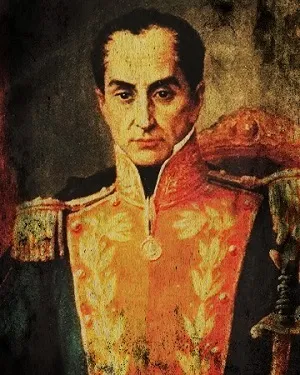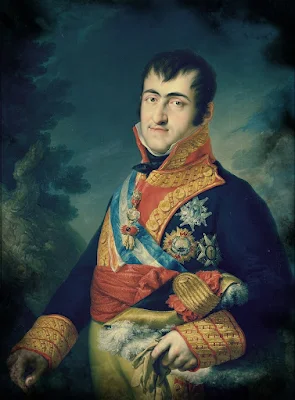Simón Bolívar
- Simón Bolívar, the son of a Venezuelan aristocrat of Spanish origin, was born in 1783, his father died when he was three years old, his mother died six years later, his uncle managed his inheritance of wealth, his uncle sent him at the age of 16, to Europe to complete his education.
- He lived in Spain and married the daughter of a nobleman there, and she returned with him to Caracas, before she got yellow fever, and died young less than a year after their marriage.
- In 1804, when Napoleon Bonaparte was approaching the peak of his career, and with the return of Bolivar to Europe, during his stay in Paris, under the renewed guidance of his friend and mentor Rodriguez, he plunged into reading the writings of European rationalist thinkers such as Voltaire, John Locke, Thomas Hobbes, Georges Louis Leclerc, Comte de Buffon, Jean le Rond d'alembert, Montesquieu, Rousseau.
- The last two had the deepest impact on his political career, but Voltaire dyed his philosophy of life, and he also met the German scientist Alexander von Humboldt, who had returned from his trip through Latin America and told Bolivar that he believed that the Spanish colonies were ready for independence.
- This idea took root in Bolivar's imagination, and on a trip to Rome with Rodriguez, where they stood on the heights of Monte Sacro, he vowed to liberate his country.
Simón Bolívar the Liberator
- The experience of Napoleon and his coronation as Emperor of France in 1804 influenced Bolivar, who was torn between admiration for the achievements of one man, and disgust at Napoleon's betrayal of the ideals of the French Revolution.
- The desire for glory was one of the permanent features in Bolivar's character, and Napoleon undoubtedly motivated it, but Napoleon's example was a warning to which Bolivar heeded, always insisting that the title of “Liberator” was higher than any other, that he would not replace it with the title of King or emperor, and then in 1807 he returned to Venezuela by way of the United States, visiting eastern cities.
⏩Check out Napoleon Bonaparte's article
Independence of Venezuela
- The Latin American independence movement took off a year after Bolivar's return, as Napoleon's invasion of Spain destabilized the colonial power, and Napoleon also completely failed in his attempt to win the support of the Spanish colonies, which claimed the right to nominate their officials.
- Following the example of the motherland Spain, they wanted to create military councils to rule in the name of the Deposed Spanish king, but many Spanish settlers saw in those events an opportunity to break off relations with Spain, and Bolivar himself took part in various conspiratorial meetings, and on April 19, 1810, the Spanish ruler was officially deprived of his powers and expelled from Venezuela.
- The junta took over, sought English support, sent Bolivar on a mission to London, to explain to England the plight of colonialism, get recognition of the independence movement and get arms and support but failed in his official negotiations.
- Bolivar succeeded in persuading the exiled Venezuelan Francisco de Miranda, who in 1806 tried to liberate his country on his own, to return to Caracas and take over the leadership of the independence movement.
- Venezuela was in a boiling state, the National Congress met in Caracas to draft a constitution in March 1811, and Bolivar involved himself in the debate that stirred up the country, saying in the first public speech of his career: “let's lay the foundation stone of American freedom without fear, indecision is doom”.
- After long deliberations, the National Assembly declared the independence of Venezuela on July5, 1811, and Bolivar now entered the army of the young republic, whose commander-in-chief was Francisco-de-Miranda, and took charge of the port of Puerto Cabello, on the Caribbean Sea west of Caracas which was vital for Venezuela.
- Shortly after the London meeting, Miranda and Bolivar separated with each other, Miranda called bolivar a “dangerous young man,” and the latter had concerns about the abilities of the aging general.
- A betrayal by one of Bolivar's officers led to the Storming of Spanish troops into the country, Miranda, the then commander-in-chief, entered into negotiations with the Spanish commander-in-chief, and a truce was signed (July 1812) that brought the whole country to the mercy of Spain.
Simón Bolívar's struggle and exile
- Determined to continue the struggle, Bolivar received a passport to leave the country and went to Cartagena in New Granada, and there he published his first great political statement, known as the Cartagena manifesto, in which he attributed the reason for the fall of the First Republic of Venezuela to the lack of a strong government, calling for a unified revolutionary effort to undermine the authority of Spain in the Americas.
- With the support of the Patriots of New Granada, Bolivar led an expeditionary force to recover Venezuela, and in a sweeping campaign, he defeated the Royalists in 6 fierce battles, after which he entered Caracas on August 6, 1813, and received the title of liberator.
- The war of independence had just begun, the majority of the Venezuelan people opposed the forces of independence and were fed up with sacrifices, a cruel civil war broke out, and Bolivar himself resorted to extreme measures, such as shooting prisoners.
- In 1814 Bolivar was again defeated by the Spaniards, narrowly escaping the fate experienced by Miranda, he fled to New Granada, where in Cartagena he was tasked with expelling a separatist faction from Bogota, he succeeded in this, then besieged Cartagena but failed to unite revolutionary forces and fled to Jamaica.
- In exile, Bolivar directed his energies towards obtaining support from Great Britain, and in an attempt to convince the British people of the right to freedom of the Spanish colonies, he wrote the greatest document of his career “letter from Jamaica” in which he wrote: “the ties that united us to Spain have been severed,” explaining: “the people who love freedom will be free in the end”.
Liberation of New Granada
- In 1817, Bolivar decided to establish a headquarters in the area of the Orinoco river that was not destroyed by the war and from which the Spaniards could not easily expel him, after three years of defeats and inconclusive victories.
- He enlisted the services of several thousand foreign soldiers and officers, mostly British and Irish, founded his capital in Angostura, ( now Ciudad Bolivar ), then created a newspaper and established relations with the revolutionary forces of the plains, including one group led by Jose Antonio Baez, and another group led by Francisco de Paula Santander, and in the spring of 1819 he laid out his main plan to attack the Viceroyalty of New Granada.
- Bolivar's attack on New Granada is considered one of the most daring in military history, as he led an attack with an army of about 2,500 men, passing through the plains in the rainy season, walking 7 days in water that flooded them to the waist.
- The Spaniards were surprised by the attack, the bulk of the Royal Army surrendered, and three days later Bolivar entered Bogota, and this action was a turning point in the history of northern South America.
Bolivar becomes president
- Bolivar became president and military dictator, urged the legislators to declare the creation of a new state, and three days later, the Republic of Colombia was created, the three provinces of New Granada now included “the countries of Colombia, Panama, Venezuela and Quito named Ecuador “.
- Since most of those territories were still under the control of the Spaniards, it was a feat on paper, and Bolivar knew that victory was finally within his grasp.
- And in early 1820, a revolution in Spain forced King Ferdinand VII to recognize the ideals of liberalism on the Home Front, an action that frustrated the Spanish troops in South America.
- Bolivar persuaded Murillo to hold truce negotiations, and the two Warriors met in a memorable meeting in Santa Ana, Venezuela, signing in November 1820 a treaty that ended hostilities for six months.
Liberation of South American countries
- When the fighting resumed, Bolivar found it easy, with his superior manpower, to defeat the Spanish troops in Venezuela, and the Battle of Carabobo in June 1821 opened the gates of Caracas to him.
- Efforts to liberate Ecuador lasted about a year, the matter came true on May 24, 1822, and on July 26 Bolivar and the Argentine revolutionary Jose de San Martin met in the port city of Guayaquil, things ended with the resignation of San Martin, he went into exile, which allowed bolivar to take command.
- In September 1823 Bolivar arrived in Lima, defeated the Spanish troops, and on December 9, 1824, the Spanish Viceroy lost the Battle of Ayacucho to Bolivar and surrendered with his entire army.
- Simón Bolívar died in late 1830 from tuberculosis, at the age of 47.









